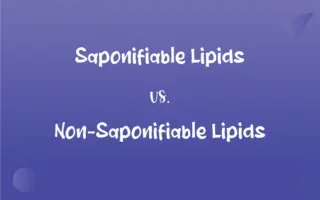Cash Crops vs. Food Crops: What's the Difference?
Edited by Aimie Carlson || By Janet White || Published on February 28, 2024
Cash crops are grown primarily for sale and profit, while food crops are cultivated mainly for consumption as food.

Key Differences
Cash crops are cultivated primarily for sale to generate income or profit. They are often grown in large quantities and sold to markets or industries that use them as raw materials. Food crops, on the other hand, are grown mainly for consumption as food, either by the farmer's family or for local consumption. They are essential for subsistence and daily sustenance.
Typical examples of cash crops include cotton, tobacco, coffee, and rubber, which are often exported and form a significant part of a country's economy. In contrast, food crops include grains like wheat, rice, and corn, vegetables, and fruits, which form the staple diet of the local population.
The cultivation of cash crops is market-driven and influenced by global demand and prices. Farmers growing cash crops may be more vulnerable to market fluctuations and economic trends. Conversely, food crops are influenced by local dietary needs and are less susceptible to global market changes.
Cash crops are sometimes criticized for prioritizing commercial value over environmental and social factors, including the displacement of local food production. Food crops are integral to food security and local nutrition and are often grown using traditional and sustainable farming practices.
In some regions, the cultivation of cash crops has led to monoculture, where large areas are dedicated to a single crop, impacting biodiversity and soil health. Food crops, particularly in subsistence farming, often involve crop rotation and mixed farming, which can be more beneficial for soil and ecosystem health.
ADVERTISEMENT
Comparison Chart
Primary Purpose
Grown for sale and profit
Grown for consumption as food
Examples
Cotton, tobacco, coffee, rubber
Wheat, rice, corn, vegetables, fruits
Market Influence
Driven by global demand and prices
Influenced by local dietary needs
Impact on Local Communities
Can displace local food production
Essential for local food security
Agricultural Practices
Often involves monoculture
Involves mixed farming, crop rotation
ADVERTISEMENT
Cash Crops and Food Crops Definitions
Cash Crops
Crops grown predominantly for export to generate income.
Sugarcane is extensively cultivated as a cash crop.
Food Crops
A crop grown primarily for consumption as food.
Rice is a staple food crop in many Asian countries.
Cash Crops
An agricultural product grown for its potential to earn revenue.
Rubber plantations are established for the cash crop's export potential.
Food Crops
Agricultural products primarily used for local or personal sustenance.
Wheat is grown as a food crop, serving as a basic ingredient in bread.
Cash Crops
Plants cultivated mainly for profit in the agricultural market.
Coffee is grown as a cash crop in many tropical countries.
Food Crops
Crops grown for their nutritional value to support daily dietary needs.
Potatoes are an essential food crop in many diets.
Cash Crops
A crop produced primarily for its commercial value.
Tobacco has historically been an important cash crop.
Food Crops
Plants that are cultivated to provide food security.
Legumes are important food crops for protein in many diets.
Cash Crops
A crop grown for sale rather than for personal consumption or subsistence.
Cotton is a major cash crop in several countries.
Food Crops
Plants cultivated mainly for feeding the local population.
Corn is a vital food crop in many parts of the world.
FAQs
Are cash crops usually exported?
Often, yes, especially if they are in demand globally.
What impact do cash crops have on biodiversity?
Monoculture cash cropping can reduce biodiversity.
Is the production of food crops more sustainable?
It can be, particularly with practices like crop rotation and mixed farming.
Do food crops contribute to local food security?
Yes, they are essential for local food security and nutrition.
Can the cultivation of cash crops lead to soil depletion?
Yes, especially with intensive monoculture practices.
What is the main purpose of growing cash crops?
To generate income or profit through sale.
What is a key characteristic of food crops?
They are primarily grown for consumption as food.
Are food crops typically grown in small-scale farms?
Yes, especially in subsistence farming.
Can a crop be both a cash crop and a food crop?
Yes, some crops like corn can serve both purposes depending on how they are used.
How do market prices affect cash crop farmers?
Fluctuating market prices can significantly impact their income.
How important are food crops for rural communities?
They are vital for sustenance and nutritional needs.
Can growing food crops improve soil health?
Yes, especially with diverse cropping and sustainable practices.
How do cash crops affect labor markets in agriculture?
They often create seasonal or export-related employment opportunities.
What role do cash crops play in a country's economy?
They can be a major source of revenue and economic growth.
Can the focus on cash crops affect local food prices?
Yes, it can lead to higher local food prices due to reduced local food production.
Are there environmental concerns with growing cash crops?
Yes, including water usage, pesticide use, and land use changes.
Are food crops more resilient to market changes?
Yes, as they are less tied to global market fluctuations.
How does climate influence the choice of food crops?
Food crops are often chosen based on their suitability to the local climate.
Do cash crops require more investment than food crops?
Often, yes, due to the need for inputs to meet market standards.
Do both cash crops and food crops need government support?
Yes, both can benefit from supportive policies and subsidies.
About Author
Written by
Janet WhiteJanet White has been an esteemed writer and blogger for Difference Wiki. Holding a Master's degree in Science and Medical Journalism from the prestigious Boston University, she has consistently demonstrated her expertise and passion for her field. When she's not immersed in her work, Janet relishes her time exercising, delving into a good book, and cherishing moments with friends and family.
Edited by
Aimie CarlsonAimie Carlson, holding a master's degree in English literature, is a fervent English language enthusiast. She lends her writing talents to Difference Wiki, a prominent website that specializes in comparisons, offering readers insightful analyses that both captivate and inform.






































































